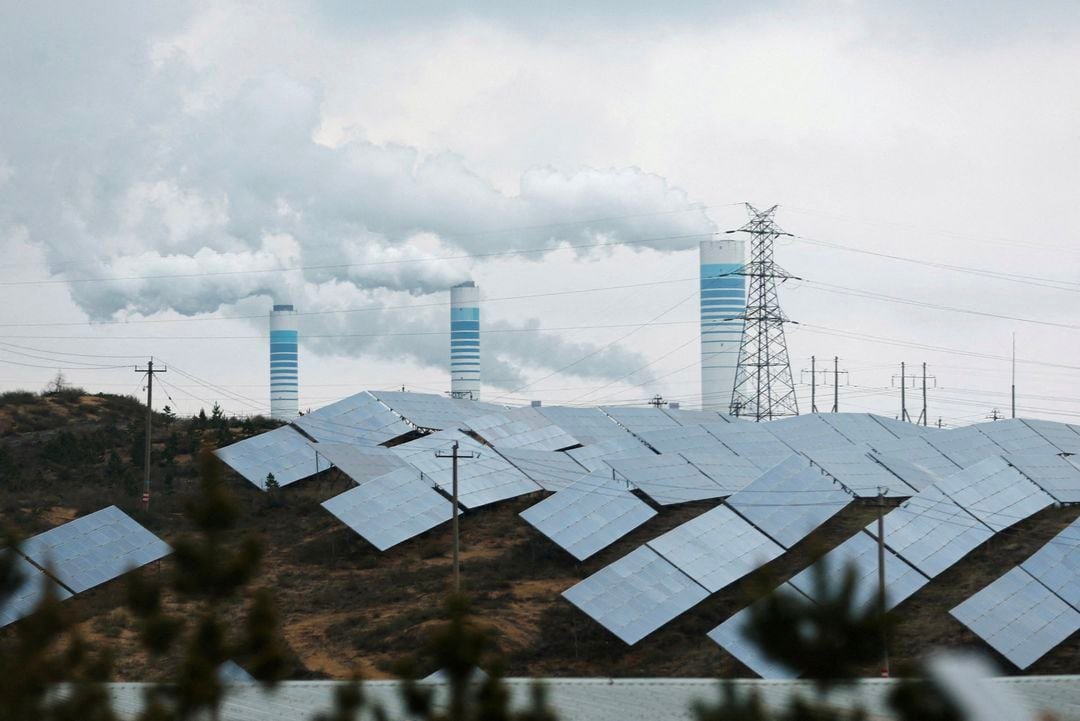Asia boosted clean electricity output and slashed its share of fossil fuels faster than North America and Europe from 2015, data shows, underscoring resistance by Asian nations to a western push to choke private financing for coal-fired power.
There is wide agreement that increasing clean power, such as wind and solar, is central to curbing carbon emissions to fight climate change. On Saturday at the U.N. climate summit, 118 governments, led by the U.S. and the European Union, pledged to triple the world's renewable energy capacity by 2030.
However, China and India did not back the COP28 pledge as it was twinned with curbing use of fossil fuels, which they see as essential to reliably meeting rapidly rising power demand.
Bolstering their view, even with coal, higher financing costs and weaker access to funds, Asia outpaced Europe and North America in fighting climate change by key measures since the Paris climate agreement of 2015, a Reuters analysis of data found.
Asia boosted clean power, including hydro and nuclear, as a share of overall power output by about 8 percentage points to 32% between 2015 and 2022, a review of data from energy think tank Ember showed.
By comparison, clean energy's share in the power mix in Europe rose over 4 percentage points to 55%, while in North America it climbed by more than 6 percentage points to 46%.
"There cannot be any pressure on India to cut down emissions," India's power and renewable energy minister R.K. Singh said on Nov. 30.
Asia slashed the share of fossil fuels in power generation by 8 percentage points to 68% in 2022 from 2015, abating more gas and coal use than Europe and North America.
Over the same period, Europe's dependence on fossil fuels fell 4 percentage points while North America's narrowed by 6 percentage points.
"The data shows that the West is not moving fast enough on scaling up renewables and storage," said Hogeveen Rutter, who works with private companies on behalf of the International Solar Alliance (ISA).
Rutter said delays in approvals for renewables, storage projects and grid interconnections in Europe and the U.S. have hampered growth of clean energy use in the West.
Asian emissions rise
To be sure, fast-growing Asia, home to half the world's population, accounts for three-fifths of global emissions from power generation, including from sectors exporting goods and services to the west.
And India and China continue to build new coal-fired plants to meet rapidly growing electricity demand.
That means power generation emissions by Asia will continue to climb, after having risen nearly 4% annually since the Paris accord as electricity demand has soared, while emissions in Europe and North America declined, the Ember data showed.
However, Asian governments have argued that the world's wealthiest countries should help poorer countries cut emissions, citing rich nations' higher per capita emissions and their unabated fossil fuel use in the last century.
This year, western nations expressed unwillingness to fund early retirement of polluting plants in Indonesia - the world's seventh largest coal-fired power generator, despite commitments to help it decarbonise.
"Asian countries with access to finance have been able to move much quicker, while other parts of Asia need more concessionality to catch up. This illustrates the need for the West to assist with concessional funding for storage to move away from coal," ISA's Rutter said.
Funding shortages and high-priced tariffs for renewables have hindered Indonesia's move away from coal, while access to funds have enabled rapid expansion of green energy in China, analysts say.
A report released on Monday estimated developing countries will need $2.4 trillion a year in investment to cap emissions.
West turns to gas
Some western nations are looking to curb finance for coal, calling it the "number one threat" to climate goals. Despite challenges, Asia, along with Europe and North America, have cut the share of coal in power use, although at a slower pace.
However, both Europe and North America are increasing use of natural gas - often described as a transition fuel - to make up for part of the decline in coal-fired power generation, while gas makes up a shrinking share of power generation in Asia.
The share of gas rose 3 percentage points to 26% of European power generation in 2022 from 2015, with North America boosting the share of gas-fired power by 6 percentage points to 36%, despite tepid power demand growth.
Cuts in nuclear power have slowed Europe and North America's fight to reduce emissions, although nuclear's share of their power mix remains well above Asia's.
"The progress the West has made is to cut use of dirty coal and use relatively less-polluting gas," said Ghee Peh, an analyst at the Institute for Energy Economics and Financial Analysis.
India, the world's second largest coal user, has argued for the phase-down of all fossil fuels instead of singling out coal, and plans to oppose the plan to ban private finance for coal. It wants rich nations to invest more in energy storage to back up renewables.
"We cannot phase out fossil fuels unless we have nuclear or until storage becomes viable," Singh said.























































